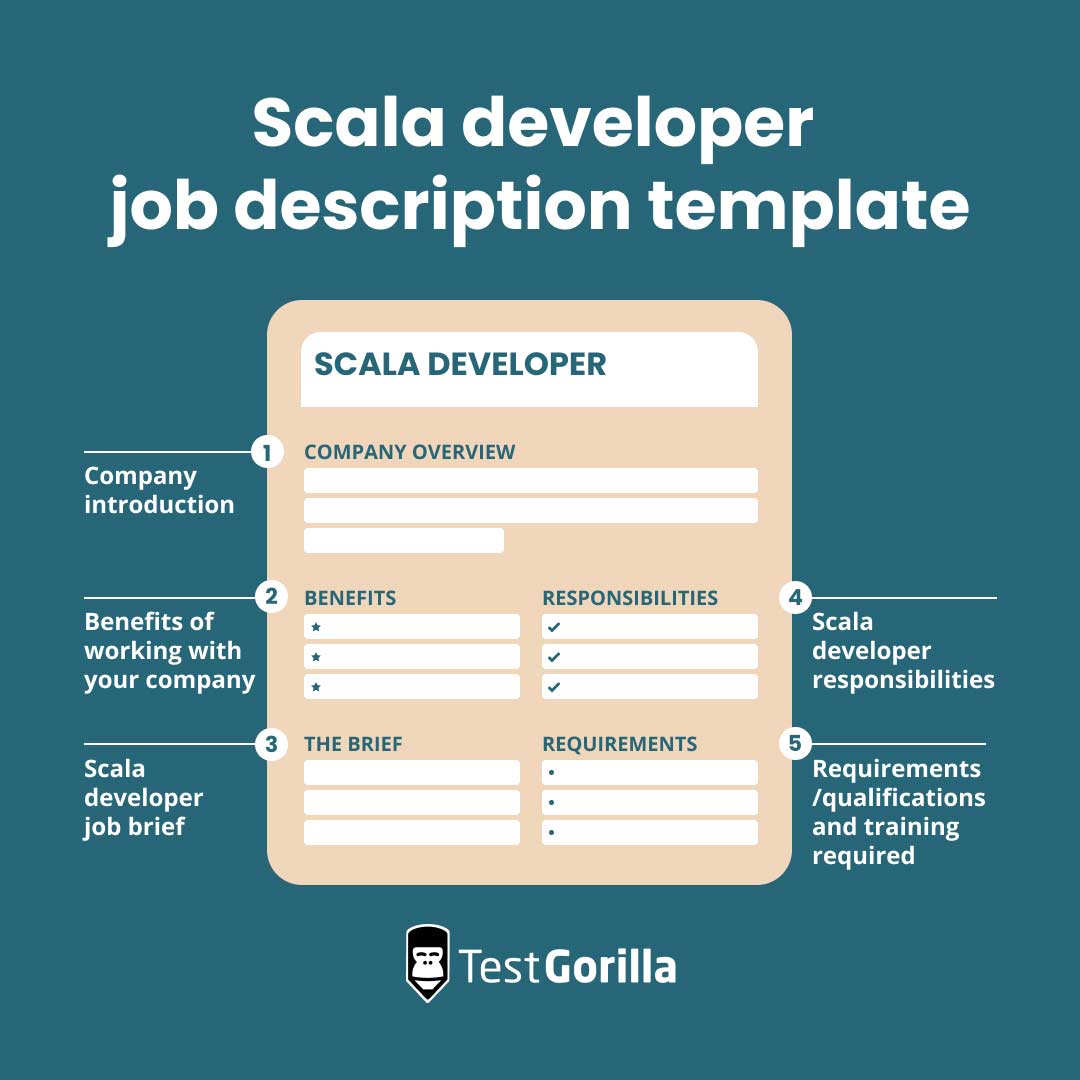Finding a Scala developer for your team can be tough. The right person can drive innovation and productivity, while a mis-hire can negatively impact your user experience and revenue. The process begins with your job description.
Crafting a precise and up-to-date job description isn't just about listing requirements – it's about attracting top-tier talent and maintaining a competitive edge. Doing this can be challenging if you feel uncertain about the role’s key skills, worry about evolving tech requirements, or find it hard to “sell” the role to your ideal candidates.
Don’t worry – we’ve got you covered.
Below, we list which skills to look for in Scala developers and how to write a job description that appeals to – and doesn’t deter – strong candidates. Plus, we include a template to get you started.
Table of contents
- What is a Scala developer?
- Key skills to look for in Scala developers
- How to write an effective Scala developer job description
- Scala developer job description template
- Scala developer job brief
- 3 things to avoid when writing a job description for Scala developers
- Next steps: Attracting and assessing Scala developer candidates
- FAQs
- Attract and assess the right talent with TestGorilla
What is a Scala developer?
Scala developers are software devs who use Scala, a programming language that blends functional and object-oriented programming. They play a huge role in making digital experiences smoother and more reliable.
For example, in the finance world, especially in areas like FinTech, Scala developers might create systems that can process thousands of transactions a second, ensuring that when you use a digital payment app, the transaction is swift and secure.
Key skills to look for in Scala developers
Here are the key technical and non-technical skills for a Scala developer recruit:
Functional programming expertise for making code that's easy to read and update (e.g., using pure functions to ensure predictable outcomes without side effects)
Concurrency and multithreading for handling tasks that run at the same time (.e.g., efficiently managing multiple user requests on a platform without any lag)
Framework proficiency, including knowledge of Play for websites, Akka for systems, and Spark for big data (e.g., using Spark to crunch large amounts of data quickly for a real-time analytics dashboard)
Collaborative mindset for discussing and brainstorming ideas with the design and backend teams to ensure smooth implementation
The best insights on HR and recruitment, delivered to your inbox.
Biweekly updates. No spam. Unsubscribe any time.
How to write an effective Scala developer job description
An effective job description blends precision, persuasion, and clarity. Here's how to strike the balance:
Mention how your company adapts to market trends
Companies on the cutting edge of Scala development should encourage candidates familiar with the latest Scala libraries to apply. Share which trends gaining traction in the Scala community your organization embraces. Also, emphasize the importance of your new developer staying current with trends. This can attract forward-thinking, highly adaptable candidates.
Even if your company doesn’t stay at the forefront of Scala development, emphasizing the importance of adapting to market trends shows candidates that your role might evolve with technology. This means that if your role does evolve, your developer can’t say, “But I wasn’t hired to do that.”
Sell the role’s benefits and perks
Your job description is also a sales pitch. Highlight opportunities for professional growth, unique projects, and the tech stack Scala developers get to gain experience in. These benefits and perks make your role more appealing.
Go beyond technicalities
Scala developers aren't just coders. They're problem solvers, critical thinkers, and team players. So, emphasize the need for qualities like analytical prowess, effective problem-solving, and the ability to collaborate efficiently. Candidates without these soft skills might refrain from applying, while those with them will feel encouraged to apply.
Scala developer job description template
Here’s a template you can modify to suit your needs.
Company introduction
Here, share when your company was founded and what its primary mission is. Highlight any cutting-edge technologies specific to Scala development that your company deploys, and point out any significant awards or achievements. Discuss the vital role Scala developers play within your company's framework.
Benefits of working with your company
Underscore your company's commitment to best coding practices, efficient problem-solving, and innovative Scala-based solutions. Highlight perks tailored to Scala developers, such as advanced software tools, continuous learning opportunities, and potential for project lead roles.
Also, describe your company culture. Do you have a supportive team environment, including a dedicated Scala community? Do you value innovation – are you committed to using the latest functional programming techniques? Candidates will use this information to determine if they’ll mesh well with your team and company.
Scala developer job brief
[Company name]
Job Title: [For example, Scala Developer, Scala Backend Developer, Lead Scala Developer, or Full Stack Scala Developer]
Reports to: [For instance, Product Manager, Technical Lead, or Team Lead]
Position type: [For example, full-time, part-time, on-site, remote, or hybrid]
[Compensation details]
Scala developer responsibilities
Design and develop high-performance Scala applications using functional programming principles.
Integrate Scala solutions with other platforms and develop APIs for data/service integration.
Use Scala frameworks like Spark to optimize application performance.
Stay updated on the latest Scala libraries – like Cats.
Create and manage unit/functional tests, collaborating with QA for comprehensive testing.
Requirements/Qualifications
Bachelor's degree in computer science or related field (or equivalent experience)
[3+] years of experience in Scala development
Familiarity with the Play and Akka frameworks
Hands-on experience with PostgreSQL and MongoDB
Knowledge of AWS, Azure, and Docker
Familiarity with CI/CD pipelines and tools like Jenkins, and Travis CI
3 things to avoid when writing a job description for Scala developers
These three common mistakes can drive away qualified candidates:
1. Vague descriptions
Vague descriptions fail to convey the true scope of the role. As a result, potential candidates might think the position is too generic or misaligned with their expertise.
So instead of just saying “Responsible for Scala development,” specify the kind of projects your Scala developer will tackle. For instance, you might say that they’ll “Develop reactive web applications using the Play framework.”
2. Unattainable expectations
It's good to have requirements, but don't list every Scala library or tool in existence. Instead of a laundry list, focus on core Scala developer skills and perhaps a few desirable (but not mandatory) ones. This ensures you don't scare off talented developers who might be an 80% fit.
3. Overemphasizing degrees
Many skilled Scala developers come from varied paths – not just traditional computer science degrees. Some taught themselves, attended bootcamps, transitioned from different roles in the field, or honed their coding aptitude in other ways.
By requiring a formal degree, you limit your talent pool and possibly miss out on some of the best candidates.
Next steps: Attracting and assessing Scala developer candidates
A strong Scala developer job description will grab the attention of potential candidates so long as you make it visible. You can do this by posting it on relevant job boards and on your company’s website.
But, it's essential to check if any applicants you draw in truly have the skills you need. Consider using TestGorilla’s universal coding tests. These span coding, cognitive ability, and personality tests. Our dedicated Scala coding assessments include entry-level, intermediate, and advanced algorithms tests.
You’ll have the most success by combining role-specific tests with other tests. You can combine up to five tests in a single assessment, and you can even add your own custom test questions, including our coding questions.
TestGorilla’s assessments enable you to gain a clear view of each candidate. This makes it easier to find your ideal candidate – someone who fits your role and meshes with your team. To learn more, read our guide on how to hire a Scala developer.
FAQs
How often should I update the Scala developer job description?
A: Update your description at least annually or when there's a significant change in the role or industry trends.
What salary should I offer in my job description?
A: In the US, the average salary for a Scala developer is $112,258 according to Glassdoor. The salary can vary based on the region, years of experience, and the specific requirements of the role. It's best to research industry-standard rates or conduct a salary survey to get an accurate figure for your location. Offer a competitive salary – one that’s in line with or better than the average – to attract top talent.
Attract and assess the right talent with TestGorilla
Securing a proficient Scala developer can significantly enhance your tech-driven projects and propel your company's growth. Creating a great job description for this role involves telling candidates about your organization, the specific technical demands of the position, and the soft skills needed.
After attracting potential hires, use TestGorilla's tests – like our Scala (Coding): Advanced Algorithms test – to assess their skills. Combine multiple tests to find a Scala developer who not only excels technically but also aligns with your team.
Take our quick product tour or sign up for our free plan to start testing your Scala developer candidates today.
You've scrolled this far
Why not try TestGorilla for free, and see what happens when you put skills first.
















